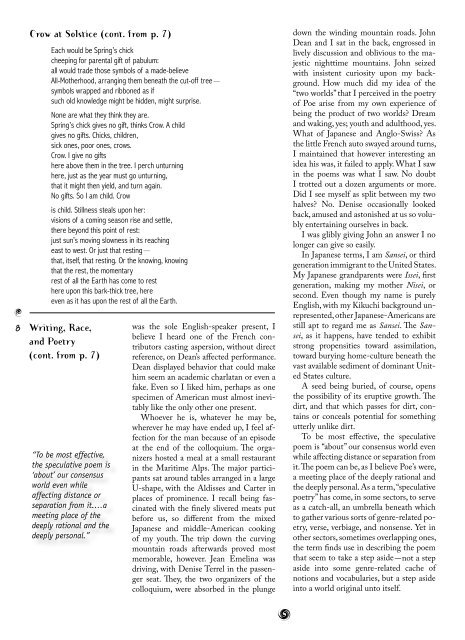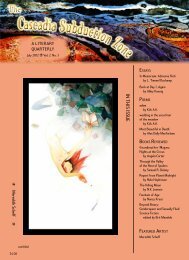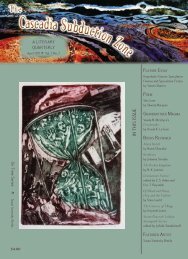Subduction
REviEwEd - The Cascadia Subduction Zone
REviEwEd - The Cascadia Subduction Zone
- No tags were found...
Create successful ePaper yourself
Turn your PDF publications into a flip-book with our unique Google optimized e-Paper software.
H<br />
8<br />
Crow at Solstice (cont. from p. 7)<br />
Each would be Spring’s chick<br />
cheeping for parental gift of pabulum:<br />
all would trade those symbols of a made-believe<br />
All-Motherhood, arranging them beneath the cut-off tree —<br />
symbols wrapped and ribboned as if<br />
such old knowledge might be hidden, might surprise.<br />
None are what they think they are.<br />
Spring’s chick gives no gift, thinks Crow. A child<br />
gives no gifts. Chicks, children,<br />
sick ones, poor ones, crows.<br />
Crow. I give no gifts<br />
here above them in the tree. I perch unturning<br />
here, just as the year must go unturning,<br />
that it might then yield, and turn again.<br />
No gifts. So I am child. Crow<br />
is child. Stillness steals upon her:<br />
visions of a coming season rise and settle,<br />
there beyond this point of rest:<br />
just sun’s moving slowness in its reaching<br />
east to west. Or just that resting —<br />
that, itself, that resting. Or the knowing, knowing<br />
that the rest, the momentary<br />
rest of all the Earth has come to rest<br />
here upon this bark-thick tree, here<br />
even as it has upon the rest of all the Earth.<br />
Writing, Race,<br />
and Poetry<br />
(cont. from p. 7)<br />
“To be most effective,<br />
the speculative poem is<br />
‘about’ our consensus<br />
world even while<br />
affecting distance or<br />
separation from it.…a<br />
meeting place of the<br />
deeply rational and the<br />
deeply personal.”<br />
was the sole English-speaker present, I<br />
believe I heard one of the French contributors<br />
casting aspersion, without direct<br />
reference, on Dean’s affected performance.<br />
Dean displayed behavior that could make<br />
him seem an academic charlatan or even a<br />
fake. Even so I liked him, perhaps as one<br />
specimen of American must almost inevitably<br />
like the only other one present.<br />
Whoever he is, whatever he may be,<br />
wherever he may have ended up, I feel affection<br />
for the man because of an episode<br />
at the end of the colloquium. The organizers<br />
hosted a meal at a small restaurant<br />
in the Maritime Alps. The major participants<br />
sat around tables arranged in a large<br />
U-shape, with the Aldisses and Carter in<br />
places of prominence. I recall being fascinated<br />
with the finely slivered meats put<br />
before us, so different from the mixed<br />
Japanese and middle-American cooking<br />
of my youth. The trip down the curving<br />
mountain roads afterwards proved most<br />
memorable, however. Jean Emelina was<br />
driving, with Denise Terrel in the passenger<br />
seat. They, the two organizers of the<br />
colloquium, were absorbed in the plunge<br />
down the winding mountain roads. John<br />
Dean and I sat in the back, engrossed in<br />
lively discussion and oblivious to the majestic<br />
nighttime mountains. John seized<br />
with insistent curiosity upon my background.<br />
How much did my idea of the<br />
“two worlds” that I perceived in the poetry<br />
of Poe arise from my own experience of<br />
being the product of two worlds? Dream<br />
and waking, yes; youth and adulthood, yes.<br />
What of Japanese and Anglo-Swiss? As<br />
the little French auto swayed around turns,<br />
I maintained that however interesting an<br />
idea his was, it failed to apply. What I saw<br />
in the poems was what I saw. No doubt<br />
I trotted out a dozen arguments or more.<br />
Did I see myself as split between my two<br />
halves? No. Denise occasionally looked<br />
back, amused and astonished at us so volubly<br />
entertaining ourselves in back.<br />
I was glibly giving John an answer I no<br />
longer can give so easily.<br />
In Japanese terms, I am Sansei, or third<br />
generation immigrant to the United States.<br />
My Japanese grandparents were Issei, first<br />
generation, making my mother Nisei, or<br />
second. Even though my name is purely<br />
English, with my Kikuchi background unrepresented,<br />
other Japanese-Americans are<br />
still apt to regard me as Sansei. The Sansei,<br />
as it happens, have tended to exhibit<br />
strong propensities toward assimilation,<br />
toward burying home-culture beneath the<br />
vast available sediment of dominant United<br />
States culture.<br />
A seed being buried, of course, opens<br />
the possibility of its eruptive growth. The<br />
dirt, and that which passes for dirt, contains<br />
or conceals potential for something<br />
utterly unlike dirt.<br />
To be most effective, the speculative<br />
poem is “about” our consensus world even<br />
while affecting distance or separation from<br />
it. The poem can be, as I believe Poe’s were,<br />
a meeting place of the deeply rational and<br />
the deeply personal. As a term, “speculative<br />
poetry” has come, in some sectors, to serve<br />
as a catch-all, an umbrella beneath which<br />
to gather various sorts of genre-related poetry,<br />
verse, verbiage, and nonsense. Yet in<br />
other sectors, sometimes overlapping ones,<br />
the term finds use in describing the poem<br />
that seem to take a step aside — not a step<br />
aside into some genre-related cache of<br />
notions and vocabularies, but a step aside<br />
into a world original unto itself.<br />
n




